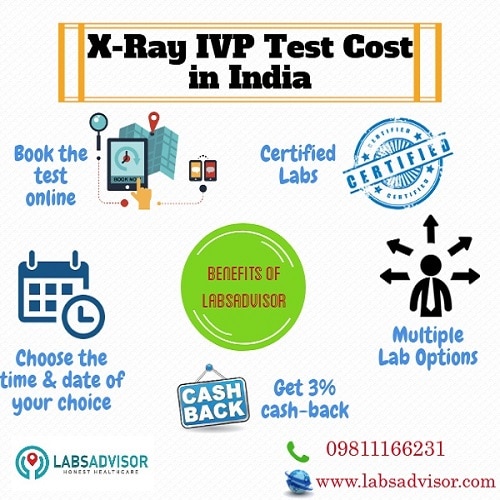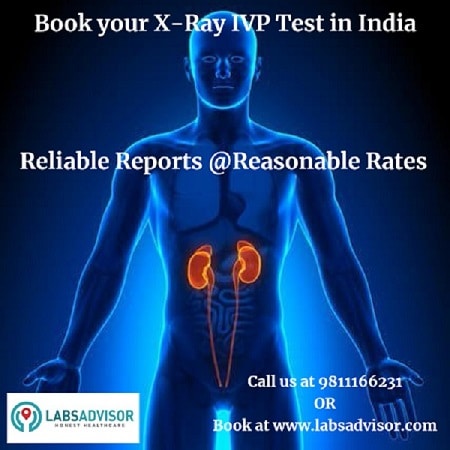
The IVP full form is Intravenous Pyelogram. IVP is also known as Intravenous Urogram (IVU). It is an X Ray test that examines one’s kidneys and urinary tract.
Book your IVP test at your local top quality labs through us at up to 50% discount. The lowest IVP X RAY test cost in India is ₹1950 only.
IVP Test in India Through LabsAdvisor
|
Book IVP test online yourself at any time of the day or night by clicking on the appropriate link in the table below.
IVP Test Price in India & Lab Details
We offer the IVP test in over 20 Indian cities. Click on the link of your city below to choose a lab and make an online booking for home collection at a suitable time.
| Find IVP Test Labs & Book Appointment | IVP Test Price Starting From |
| IVP Test Cost in Delhi | ₹1950 |
| IVP Test Cost in Gurgaon | ₹2200 |
| IVP Test Cost in Bangalore | ₹2550 |
| IVP Test Cost in Mumbai | ₹2975 |
| IVP Test Cost in Chennai | ₹2475 |
| IVP Test Cost in Hyderabad | ₹2880 |
| IVP Test Cost in Other Indian cities | ₹1950 |

Frequently Asked Questions About IVP Test
What is an Intravenous Pyelogram (IVP)?
The IVP full form is Intravenous Pyelogram. IVP is also known as Intravenous Urogram (IVU). It is an X-Ray test that examines one’s kidneys and urinary tract. It requires a contrast liquid or dye to be injected into the veins to evaluate the kidneys, ureters and bladder.
Intravenous is injecting something into the veins. Pyelogram, on the other hand, refers to the images of the internal structure of the kidneys and the tubes which start from the kidney to the bladder and the ureters.
Why is an IVP done?
IVP is done because, on an ordinary X-Ray, kidneys don’t show up very well. It is possible to see the shape of each kidney, but, a detailed analysis of the internal structure and information on how well they’re working is only possible through an IVP. An IVP nowadays is also referred to as IVU.
When is an X-Ray IVP Performed?
Your doctor may ask you to get an IVP done in case you are suffering Urinary Tract Infections or if you have any sign of kidney problem. These might include pain in your side and back or traces of blood in your urine. An IVP can help diagnose the following:
- Bladder & Kidney Infections
- Stones in the Kidney and Bladder
- Tumors
- Enlarged Prostate
- Abdominal Injuries
- Urinary Tract Blockages

Do I need any kind of preparation for an IVP test?
You are likely to be instructed by your doctor not to drink or eat a few hours before the examination. If you’re diabetic and take insulin, make sure to ask your doctor if you can take insulin on the day of your examination or not.
Before an IVP, inform your doctor if:
- You are pregnant
- Allergic, especially to iodine or seafood
- You’ve ever had an adverse reaction to contrast dye
The doctor may also recommend you to stick to a special diet a day before your IVP appointment. This is done to minimize solid stools in the large intestine as stool makes it harder to read X-Rays.
What is the procedure for IVP Test?
Before the test:
Before being taken to the X-Ray room, you will be asked by your doctor or technician to empty your bladder.
During the test:
You will then be asked to lie on the X-Ray table for examination. First, an ordinary X-Ray of your abdomen will be performed. This is done specifically to look for stones in the kidney if any. Then, an injection of the X-Ray contrast medium will be injected into your veins in the arm.
As the dye is injected into your body, you might feel a tingling sensation. You might also feel like you’re urinating. This is something not unusual and completely normal.
A series of X-Ray pictures will then be taken by the camera, every few minutes for about 30-60 minutes. You will be asked to hold your breath every-time before a picture is taken. This is done to determine the correct size of your kidneys and track the dye as it moves through your kidney and ureters to your bladder.
Before the last picture is taken, you will be asked by the radiologist to empty your bladder as they need to image the urinary tract in action.
In some cases, the radiologist may apply a compression band around the body to better visualize the urinary structures.
What are the benefits & side-effects of an IVP Test?
Benefits:
Images given out by IVP provide extremely valuable and in-depth information which in turn helps doctors recognizing, diagnosing, and treating the patient’s urinary tract conditions which range from stones to even cancer.
Usually performed without any major side effects, this examination often provides sufficient information to direct treatment with medication, hence avoiding unnecessary surgical procedures.
Side-effects:
The risks associated with an IVP are the usual risks associated with the radiation and also from the injection of contrast dye. Although you are minimally exposed to the radiation, this small amount can harm a developing fetus. So, pregnant women must be extra careful when prescribed this examination.
Some patients may develop a rash, and a few others may experience a mild asthma attack. It is very rare that someone gets a severe allergic reaction, similar to a peanut allergy.
Contrast dye can, in some rare cases, affect the functioning of your kidney. But, this is temporary, and drinking lots of fluids after the examination helps you get rid of the abnormality.
What can be the possible interpretation of the IVP test results?
After an IVP, a radiologist, exclusively trained to administer and interpret radiology examinations, reviews, and analyses the images were taken during the examination and give a signed report to your physician. The time taken for the pictures to be available varies from lab to lab. Usually, it takes a day or two to get your IVP result.
Sometimes your doctor may ask for a follow-up examination. Do not fret; at times a follow-up examination is done to monitor even the smallest change in an abnormality over time. Also, follow-up examinations are sometimes the best possible way to check if a particular treatment is working out well for the patient or to see if an abnormality is stable or changes over time.
Thus, an IVP or IVU can be extremely helpful in the detection of urinary tract problems in the human body. Depending on the results and diagnosis, the right course of treatment can be followed, which could be both medicinal and surgical.
Other topics you may be interested in:-







If your city is not listed in the table above, call us on +918061970525. We will get back to you with the IVP test price near your location.
Get the lowest IVP test cost in India by calling us at
☏+918061970525
If you want us to call you back, click on the link below